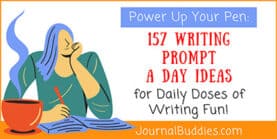Women’s History Month Questions and Writing Prompts— March is Women’s History Month and March 8th is International Women’s Day. That makes March a particularly excellent time of year to focus your student’s thinking on the roles of women in America. Take a look now and enjoy. Yes!

Writing in its many forms — from essays, research reports, and poetry, to journaling and more — are wonderful tools to encourage students to examine ideas in new way.
And now, when you have your students write about women-themed topics, your students will no doubt gain a deeper understanding of the advancements and the challenges that women have faced throughout history.
You see…
Our excellent Women’s History Month questions, prompts, and ideas to write about listed below will encourage your writers to think more about the issue related specifically to women, some of which they still face today, while others are about the past.
And…
In our list of 50 Women’s History Month journal prompts, students will consider everything from the most influential women they know to their own perceptions about men and women.
Further…
They’ll answer questions about the representation of women in popular media and discriminatory language.
Plus…
Students will also have the opportunity to write letters to famous female figures and to think about what the word “feminism” really means. You can also simply ask your students to write in their journals and to think critically about women’s rights.
Finally, you’ll find an excellent list of Women’s history topics and an excellent poetry list for your writers to explore and write about if they so choose.
So, get to it…
Use these journal prompts, questions, and important women-centric topics to teach students about the importance of Women’s History Month! I think you’ll be glad you did.
50 Writing Prompt Ideas about Women’s History Month
- Who is the most influential woman you know? How does she inspire you?
- Do you think women have equal rights to men today? Why or why not?
- Why do we need a special month to honor women?
- What types of stereotypes do people have about women? Why can stereotyping be dangerous?
- List three important qualities women should have and three important qualities that men should have. Were the traits you listed different for men and women? What can you learn by examining these differences?
- Do you know any women who work in STEM (Science, Technology, Engineering and Mathematics)? Why is it important for women to contribute to these fields?
- Do you think men and women are naturally different from one another? Why or why not?
- What are some of the biggest challenges that women face today? How will these change in the next 20 years?
- Research a woman who was the first female to work in a traditionally male field. What kind of struggles do you think she faced?
- Why is it hard for women to gain access to jobs and communities that are traditionally male? How will others in the field perceive her?
- What are some important gains women have made throughout history?
- Which achievement made by feminists are you most thankful for? Why?
- When do you think America will have its first female president?
- Eleanor Roosevelt once said: “The future belongs to those who believe in the beauty of their dreams.” How does this quote relate to feminism and the struggle for equal rights? How can you use it to inspire your own actions?
- Who is your favorite historical female figure? What do you admire about her?
- Think of your favorite television show. How are the female characters different from the male characters?
- Do you think that the characters in popular media accurately represent women?
- Why is it important for both women and men to be well-rounded in a number of different fields and traits?
- List three professions that are traditionally occupied by men. Are these jobs becoming more gender-neutral today?
- List three professions that are traditionally occupied by women. How is it harmful to women and men to link these jobs to gender?
- Why do you think there are more male politicians than female politicians?
- The Equal Pay Act was signed in 1963 when women earned just 59 cents for every dollar that men earned. Today, women earn about 78 cents for every dollar that men earn. Why do you think it is taking so long to close the pay gap? How can we close it more quickly?
- Why have women been traditionally expected to handle all domestic chores?

- Who cooks, cleans, does laundry, etc. in your home? Does this situation work for your family?
- Why do you think women have often not been allowed to vote throughout history?
- Write a story about a powerful female world leader. What is her life like? Do people expect her to act in a certain way?
- Write a letter to a notable female figure, thanking her for the contributions she has made to women’s rights.
- Have you ever wanted to try an activity that is considered to be “for girls” or “for boys” only? Did you try it anyway? How did you feel?
- Has the feminist movement succeeded? Why or why not?
- Write about something that people could do to prevent discrimination against women.
- How can language be discriminatory? What are some ways you can use words to make your speech more gender-neutral?
- What does the word “feminist” mean?
- Do you consider yourself to be a feminist? Why or why not?
- Does the world need more feminists? Why or why not?
- What other groups can women work with to promote equality in our world? Where are there other opportunities to end discrimination?
- What are some important contributions women have made to our world?
- Imagine yourself as a woman living during the suffrage era. What would your life be like?
- List three famous women and three famous men that you respect. Next, think about their professions and roles. Were there any differences in the types of people you chose? Why or why not?
- Women didn’t have the right to vote in all states until 1920. Why is the right to vote so important? What effects are caused by denying this right to a particular group of people?
- How can women’s equality help all people?
- Think of three professions in which the job title is known as “______man,” (such as mailman, garbage man, etc.). What do these titles say about our perceptions of women and the types of jobs they can hold?
- Why don’t we have a Men’s History Month?
- Mae Jemison, the first black woman to travel in space, once said: “Never limit yourself because of others’ limited imagination; never limit others because of your own limited imagination.” Why is this sentiment so important? How does it relate to Women’s History Month?
- Write about one of the most important lessons you learned (or hope to learn) during Women’s History Month.
- If you could meet any influential woman, who would you choose? What questions would you ask her?
- Look at the Civil War, the Depression, and World War II and ask this question posed by feminist theorist Cynthia Enloe: “Where are the women?” Write about women’s roles in these important events.
- Why is it important to look back at history from a female perspective? How is it different from the way we typically look at history?
- What traits do the women in your family share? How have they informed your opinions of what women should be like?
- Write a letter to an influential woman in your life and let her know that she has made an impact on you.
- How do you think the fight for gender equality will change over the next 100 years? Will we ever attain true equality?
I hope you enjoyed these Women’s History Month questions and enjoyed the process of taking a deep dive into how women still struggle to gain equality in modern society. Perhaps you’ll even use this list of ideas in your class lesson plans.
Now, see these…
Women’s History Month Resources & Links
17 More Women’s History Month Topics to Explore
In case our list of 50 Women’s History Month Questions wasn’t enough to inspire you, take a look at these ideas.
You see…
Each topic below is related to women in history. Choose one topic — or more — to research and then write about what you learned about women, history, how what you learned has changed you, or anything else you’d like to include in your writing or journal entry.
- Explore what is meant by the Feminine Mystique
- Nurse careers as they’ve changed over the last 100 – 150 years
- Compare and contrast Gender Inclusion in the 1900’s and 2000’s
- Silent Spring by Rachel Carson is significant because…
- Free-thinking women have…
- The women’s movement
- Leadership roles for women and how they’ve changed
- Elizabeth Cady Stanton is most noted for…
- The Equal Rights Amendment
- First American woman to…
- Famous (or not so famous) women abolitionists
- Ida Wells-Barnett and anti-lynching crusade
- Sally Ride (The first American woman in space)
- Longest-serving woman in the US Senate in Washington DC
- Massachusetts Bay Colony as it relates to women
- Women in the late 1930’s, 40’s, 50’s, or any other decade of your choice.
- United Nations – UN Women and what they do in the world
From the feminist movement to lessons we can learn from famous women over time as well as other important topics from women’s history, your writers can get inspired to explore more about women throughout time.
Now, let’s…
Write about Women and Poetry
Yay, let’s explore poetry! From the list below of 7 poems celebrating International Women’s Day Poetry, choose a poem to read and then write about how it affects you and why.
- There’s Wisdom In Women – Rupert Brooke
- Phenomenal Woman – Maya Angelou
- Poet as Housewife – Elisabeth Eybers
- I Am She – Butch Decatoria
- Still I Rise – Maya Angelou
- We As Women – Charlotte Perkins Gilman
- They Shut Me Up in Prose – Emily Dickinson
What an amazing list of poems!
Ok, that’s all for today.
Until next time, write on…
If you enjoyed these Women’s History Month Writing Prompts,
please share them on Facebook, Twitter, and/or Pinterest.
I appreciate it!
Sincerely,
Jill
journalbuddies.com
creator and curator

A few more excellent resources to see:





